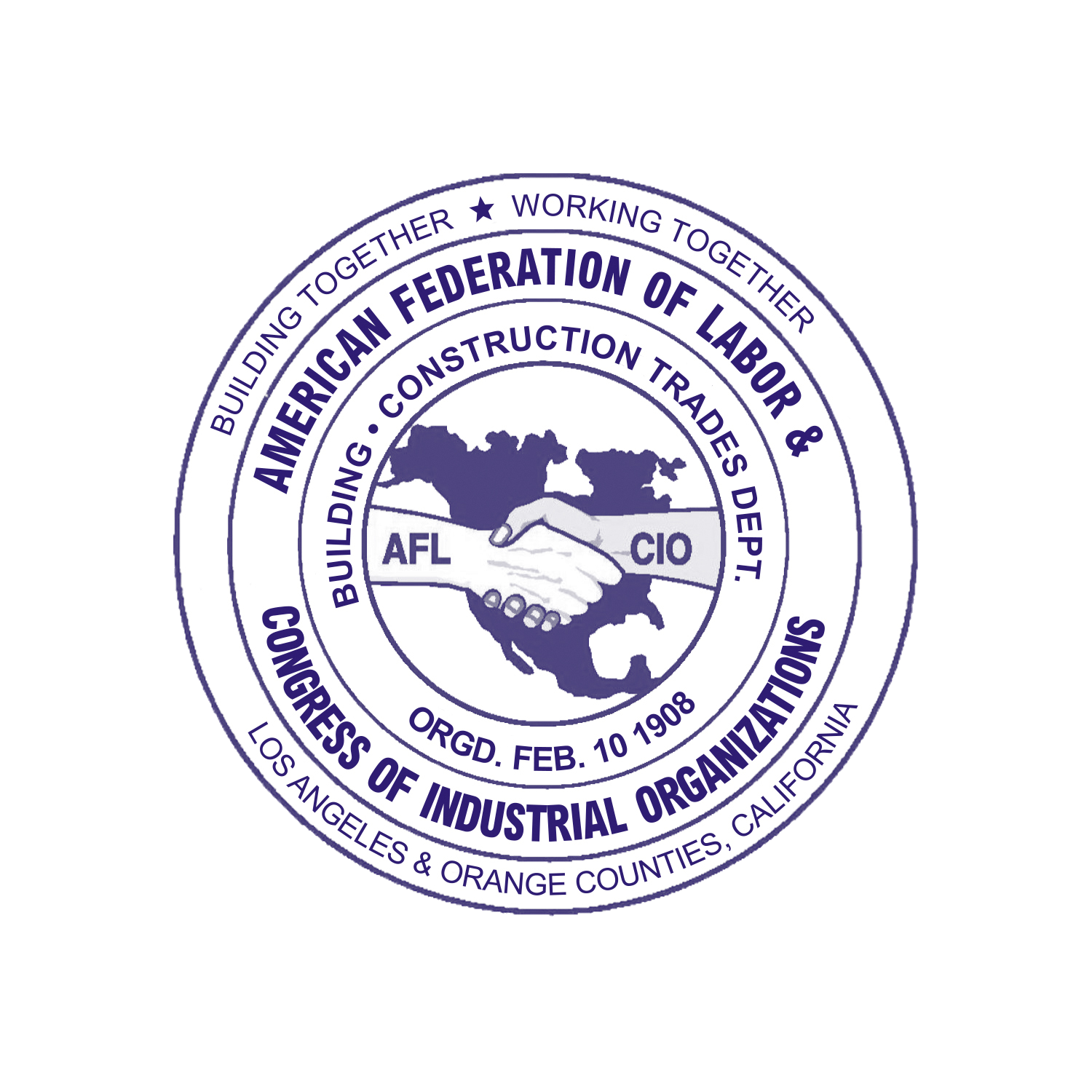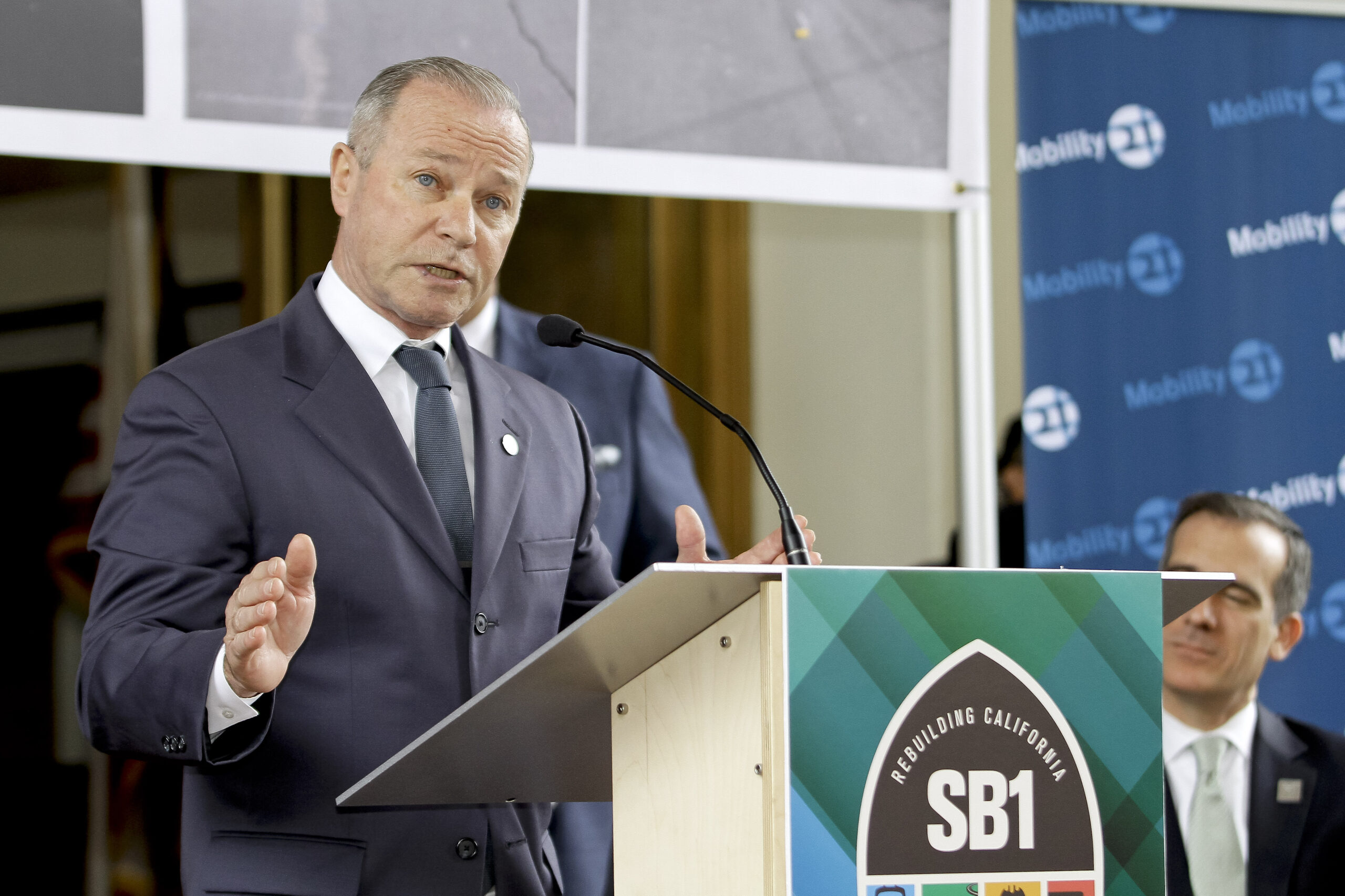UNION STATION, LOS ANGELES—The battle to defend SB 1 is on. It generates thousands of Building Trades jobs yearly on road and transit work. But it’s under attack by Prop. 6 on the Nov. 6 ballot.
Building Trades members, leaders and allies urge a “No” vote on Prop. 6.
Gov. Jerry Brown and Los Angeles Mayor Eric Garcetti joined State Building Trades President Robbie Hunter and other labor, business and transportation leaders from across California for a summit on State Senate Bill 1 at LA’s Union Station.
“The real test here is, are we mature enough, are we responsible to pay for what we need?” Brown asked. “Our roads are deteriorating. Our bridges are less stable. This is the real test of any kind of sustainable civilization: You have to pay for what you need to keep the civilization going.”
State Building Trades President Robbie Hunter stressed California’s ascendant position when he spoke
with fellow state leaders to the press about SB 1.
“The infrastructure of tomorrow, we’ve got to build today,” Hunter said. “I believe California wants a better way of life. We will do it ourselves with SB 1.”
Brown spoke in the old ticketing concourse of Union Station, which is now used by about 100,000 commuters per day and is planned to expand.
Brown said, “To build our roads, to fix our bridges, to make sure our trains run on time—that’s why we’re here at this great station. The people that built this had a vision and visions aren’t free.”
Hunter noted that much of today’s infrastructure comes from previous eras.
“You drive by some of these bridges in Los Angeles and you can see the stamp on the side from when they were built: 1939, 1941,” Hunter said. “The Building Trades built the Hoover Dam, built the Golden Gate Bridge. Now we need to move forward and build again.”

6,500 Projects and 16,000 Jobs a Year
SB 1 generates almost $6 billion a year, and much of the funds will go to LA and Orange Counties.
Before the conference, California Transportation Commission, Metro and other public agencies announced SB 1 disbursements of more than $1.2 billion for transportation projects in Southern California.
More than 6,500 projects are now under way, with work being performed by Building Trades local affiliated unions.
California State Transportation Agency Secretary Brian Annis announced his agency awarded Caltrans $309 million for three major construction initiatives in Los Angeles County: The Trade Corridor Enhancement Program, Solutions for Congested Corridors Program, and the Local Partnership Program that includes $28.2 million for a new Santa Clarita Metrolink Station.
“The path to a more sustainable, resilient tomorrow runs through our investments in infrastructure today,” Garcetti said.
Senate Bill 1, passed in 2017, represents one of the largest funding initiatives ever for Building Trades construction projects.
SB 1 creates 16,000 jobs per year for the Buildings Trades, said Ron Miller, Executive Secretary of the Los Angeles/Orange Counties Building and Construction Trades Council.
A Huge Economic Driver
“It’s a huge economic driver for the region and it’s a huge economic driver for the Building Trades,” Miller said. “We invest $200 million a year training apprentices in the state of California. We’re targeting communities that include the formerly incarcerated, communities of color, women, at-risk youth, emancipated foster youth, long-term unemployed, the homeless and veterans.
“When other interests were attacking the unions, we were running top-notch training programs.”
Miller said Trades mobilization will help defeat Prop. 6. “We’re on the right side, we’re willing to put our money where our mouth is, and put the boots on the ground.”
Proposition 69, which passed June 5, requires that revenues generated by SB 1 be used only for transportation purposes
Ernesto Medrano, Orange County Representative for the Building Trades, said Prop. 69 takes away one of the main arguments the opposition has claimed about SB1.
“There’s always been this misconception, with critics alleging that funding will go for other measures,” Medrano said. “Prop. 69 secures the funding for what it was intended to begin with.”




